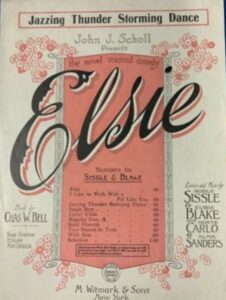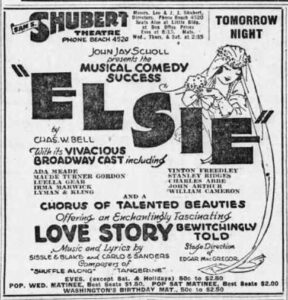YOUR DAILY DOSE OF EUBIE!!!!
The success of the Shuffle Along score led to many new opportunities for Sissle and Blake in 1922, including a chance to provide songs for a “mainstream” (white) musical, Elsie. Produced by John Scholl, the shows numbers were split about equally between Sissle and Blake and Carlo and Sanders (whose previous show was Tangerine). Monte Carlo and Alma Sanders were a husband-and-wife songwriting team with several Broadway musicals to their name. Apparently, Sissle and Blake were brought in to spice up the score after the show previewed in Chicago to somewhat tepid response. An agreement with Scholl and coproducer Edgar J. MacGregor gave the duo a measly $1.00 upfront payment, but in return promised a royalty of 1½ percent of the show’s weekly gross for the length of its run—wherever it played. The producers held the song rights as long as the play was performed at least 50 times in any theatrical season following its initial run. Even more generously, Sissle and Blake were to collect this percentage even if their songs were subsequently dropped from later productions. Clearly, the savvy songwriters were trading immediate profit for long-term income—although sadly the play had little success and the promised income failed to materialize.

Elsie was a typical son-of-a-millionaire-courts-a-showgirl romance, with the family disapproving of the match until the charming soubrette wins them over. Several critics mentioned Sissle and Blake’s song “Baby Bunting” as being the hit of the show without mentioning that its authors were black. In an interview with the Pittsburgh Courier, Sissle Sissle discussed the difficulty they had in placing this song before they scored their hit show:
“Our race has been an asset in the success of “Shuffle Along,” but a handicap in our song writing. Publishers looked to us for jazz music and would accept such, but when we offered something more serious they would not take it.
“For example, we wrote “Baby Bunting,” the song hit of “Elsie,” seven years ago, but could not sell it. “Two Hearts in Tune,” another hit of “Elsie,” also was written several years ago, as were “My Vision Girl,” “Mary Ann of Maryland,” and several others. But the publishers could not see them until after our success with “Shuffle Along.”
Sissle concluded optimistically, “Now that we have arrived, so to speak, the handicap of race has been forgotten. Sadly, however, it turned out that black songwriters would have little opportunity to write for Broadway shows—or the explosion of sound musical films—in the later ‘20s and beyond.

Besides occasionally mentioning the hit Shuffle Along, both songwriting teams were treated more or less as equals; in fact, Sissle and Blake’s contributions were more often called out as song hits than the others. Alan Dale noted that he particularly appreciated that the score wasn’t “jiggy or jazzy,” perhaps a backhanded compliment to the fact that Sissle and Blake’s contribution was solidly in the mainstream Broadway style. Despite solid reviews, Elsie was not a hit, but it did attract the attention of British producer Charles Cochran, who would hire Sissle and Blake to provide songs for a few shows that he produced.